Africa's First Ladies Come to America
By Richard B. Muhammad -Editor- | Last updated: Apr 9, 2013 - 1:30:46 PMWhat's your opinion on this article?
Seeking partners, seeking progress
Wives of presidents and government ministers attend major health summit in United States; welcome Black America’s help to make change, progress.
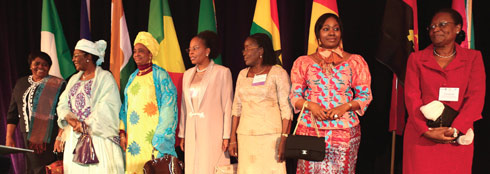
The Second African First Ladies Health Summit in Los Angeles included the wives of the presidents of Guinea, Mali, Mozambique, Namibia, and Niger. The second lady of Ghana and government ministers from Nigeria, Congo-Brazzaville and Angola. Photos: Malcom Ali/finaimage.com
|
LOS ANGELES (FinalCall.com) - When the doctor spoke at the Wednesday morning session inside the Intercontinental Hotel Ballroom, the message was clear: He has had experience, success and needs a new job. He wants to come back to Africa and work on public health problems.
More impressive than his pitch were the women to whom it was addressed: The unofficial interviewing committee was the wives of African leaders and government ministers attending the second African First Ladies Health Summit April 2-4.
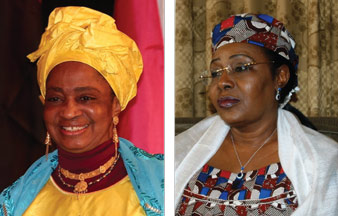
(L) First Lady Traore Mintou Doucure pf Mali (R) First Lady Niger Aissata Issoufou Mahamadou
|
“The African first ladies as powerful as they are, as influential as they are, they have been neglected from participating in some of the most critical pieces on our continent,” said Ted Alemayhu, the founder and CEO of U.S. Doctors for Africa.
“I wouldn’t dare say it was purposeful but there was not enough effort to get them engaged or to recognize them—their brilliance, their knowledge, their expertise,” said Mr. Alemayhu, whose non-profit is based in Los Angeles. He was born and raised in Ethiopia and came to the United States as a child.
Four years ago, Mr. Alemayhu brought 15 African first ladies to Los Angeles to showcase the women and their causes.
This year’s summit offered presentations from the first ladies about the challenges in their countries, reports from United Nations officials and major U.S. based non-profits on AIDS and other diseases, medical professionals sharing information about new products, techniques and strategies, updates from conference corporate sponsors about their work in Africa and other advocates and businesspeople interested in the Motherland.
Five first ladies enjoyed a rare, major platform in America to speak directly about their work and their needs.
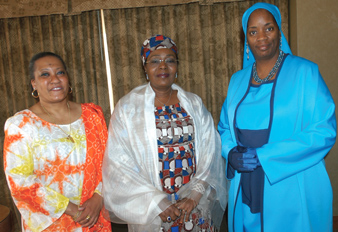
The first lady of Niger, center, with interpreter Jeannine Scott and Charlene Muhammad. Photo: Richard B. Muhammad
|
When the first ladies made presentations in the ballroom, with African and U.S. media capturing their words, deaths of mothers in child birth, AIDS, malaria, infant deaths, sickle cell anemia, and barriers to education were some concerns.
But they also shared their work to resolve their own problems. First Lady Aissata Issoufou Mahamadou has a one and a half year old foundation Guri Vie Meilleure-Making a Better Life, which focuses on health-nutrition, education (including vocational training and improving literacy) and the environment.
In the past, she has brought medical supplies and school supplies to Niger. She also provided a generator to the country’s national hospital, allowing for life saving work despite power outages that sometimes strike.
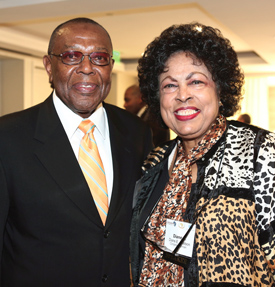
Abdul Akbar Muhammad and former Rep. Dianne Watson at African First Ladies Health Summit. Photos: Malcolm Ali/finaimage.com
|
First Lady Mahamadou has promoted tree planting, discouraged cutting trees and focused on finding alternatives to using wood for fuel. Niger borders the Sahara Desert and struggles with problems of access to water and drought. She felt positive about talks and promises of possible help and, like the other first ladies, was focused on follow up.
“It really is my duty to serve my people,” said first lady, who spoke in French, through a translator. Her husband is President Mahamadou Issoufou.
“As I accompany my husband, as president, it is my sovereign duty to actually ensure that I undertake works that are of service to my country,” she explained. That work sometimes occurs under the name of Gure Vie Meilleure and other times in her role as the president’s wife. She is seeking a partner for Computers For All, her program designed to expand student access to computers and technology.
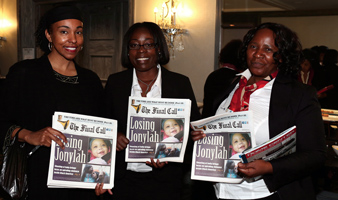
Conference participants receive copies of The Final Call.
|
“Our students need to keep pace with what is happening in the world,” said First Lady Mahamadou.
Asked what Black Americans can do to help, she responded: “I have had a number of offers for medical supplies, for school supplies, everyone has something they would like to provide but the transport costs are a bit problematic. If you could even put a campaign out to help raise money to get the equipment and supplies in country for distribution to the people that would be a great first step.”
“I am very pleased to know that African Americans are concerned about the issues going on in my country and would be pleased to help my country,” said the dignified African woman at the end of the warm nearly 30-minute interview.
First Lady Traore Mintou Doucure of Mali came to the summit to exchange experiences with the other first ladies. Health is the most essential thing, she told The Final Call in an exclusive interview. She also spoke in French through an interpreter.
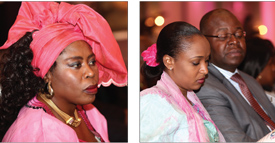
Audience listens during summit presentations.
|
Education for young girls and boys is one of her major focus areas.
“I am looking for partnerships and I don’t know if anyone is hearing me and touched by my message,” said Mali’s first lady, through the interpreter. She invited those who want to help to contact her ADAP-Mali.
The other first ladies at the summit were Madame Djene Kaba Conde of Guinea; Dr. Maria de Luz Dai Guebuza of Mozambique; and Madame Penehupifo Pohamba of Namibia. Madame Matilda Amissah-Arthur, Ghana’s second lady, also attended the summit. Nigeria’s first lady was represented by Madame Zainab Maina, who is minister of Women Affairs and Development. Madame Emilienne Raoul, minister of Social Affairs and Family, attended on behalf of the first lady for the Republic of Congo-Brazzaville and Ana da Costa, commercial representative for Angola, flew in from Washington, D.C. to represent her first lady.
Black congresswomen Karen Bass and Maxine Waters participated in the gathering. Rep. Waters presented the first ladies and dignitaries with plaques, talked about the importance of debt relief for Africa and good foreign policy toward the continent.
“With a little support they can do a lot,” said retired U.S. Representative Dianne Watson, whose former congressional district included Los Angeles.
“There’s so much we can share in partnership and that’s what this is all about. They can learn from us and we can learn from them. And the things that grow naturally there can be developed for the benefit of all, and rather than take from these nations, they can take their own intellectual property and benefit their whole country,” she said.
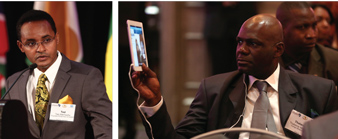
(L) Ted Alemayhu, founder and executive chairman of Doctors for Africa. (R) Participant records proceedings at health summit.
|
Proctor and Gamble was a major sponsor for the summit as was Newmont Mining Corporation. The United Nations Office on Partnerships and the African Union Commission to the United States also supported the summit.
Proctor and Gamble, a major U.S. based corporation, shared its work in sub Saharan Africa, and employs 5,000 people in the region. Some of the P&G programs include providing health education for girls and sanitary pads that allow girls to attend school, detergent in smaller, less expensive packages, and diapers that keep children dry for up to 12 hours. The company also has built a manufacturing plant in Nigeria.
Newmont Mining’s work in creating a health clinic that serves workers at a major mine and the surrounding community in Indonesia was shared an example of how health care can be better delivered to Africa.
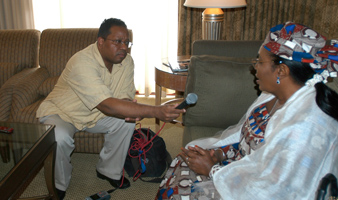
Richard B. Muhammad Final Call editor interviews the first lady of Niger Photo: Charlene Muhammad
|
Each company should pay a standard tax for women and children, he argued. But unity is needed to prevent corporations from avoiding responsibility by simply doing business in a nation without such requirements, he continued. The “unity of the countries” is key, said Min. Akbar Muhammad. Africa has to be strong enough to tell corporations, “you robbed us,” and must now help us rise, he added.
While working and living in Africa, and visiting to Liberia in the 1990s there was a need to help Liberians suffering and displaced by war, recalled Min. Akbar Muhammad. Then-president Charles Taylor could not travel to the U.S. to appeal for help but Liberia’s first lady came in the summer of 1999, spoke to churches and groups and was able to get tremendous help for Liberian children in those camps, he noted.
“First ladies to me play a major role, sister city relationships which have not been exploited to the degree that it can to help Africa, church groups in America, mosque groups, social organizations that will build schools and send equipment to Africa. In the African American community, first ladies of Africa are honored,” Min. Akbar Muhammad said.
The best thing that Africa’s children in the West can do is bring their talents and skills to the Motherland, he said.
According to Africa Economic Outlook, the continent remains one of the fastest growing regions worldwide. But, the group warned, the continent’s youth population will double by 2045 and joblessness among young people is a problem.
The International Monetary Fund late last year, predicted economic growth for Africa would increase by 5.7 percent in 2013. The forecast was up slightly from earlier World Economic Outlook estimates.
INSIDE STORIES AND REVIEWS
-
-
About Harriett ... and the Negro Hollywood Road Show
By Rabiah Muhammad, Guest Columnist » Full Story -
Skepticism greets Jay-Z, NFL talk of inspiring change
By Bryan 18X Crawford and Richard B. Muhammad The Final Call Newspaper @TheFinalCall » Full Story -
The painful problem of Black girls and suicide
By Charlene Muhammad -National Correspondent- » Full Story -
Exploitation of Innocence - Report: Perceptions, policies hurting Black girls
By Charlene Muhammad -National Correspondent- » Full Story -
Big Ballin: Big ideas fuel a father’s Big Baller Brand and brash business sense
By Bryan Crawford -Contributing Writer- » Full Story






 Click Here Stay Connected!
Click Here Stay Connected!








